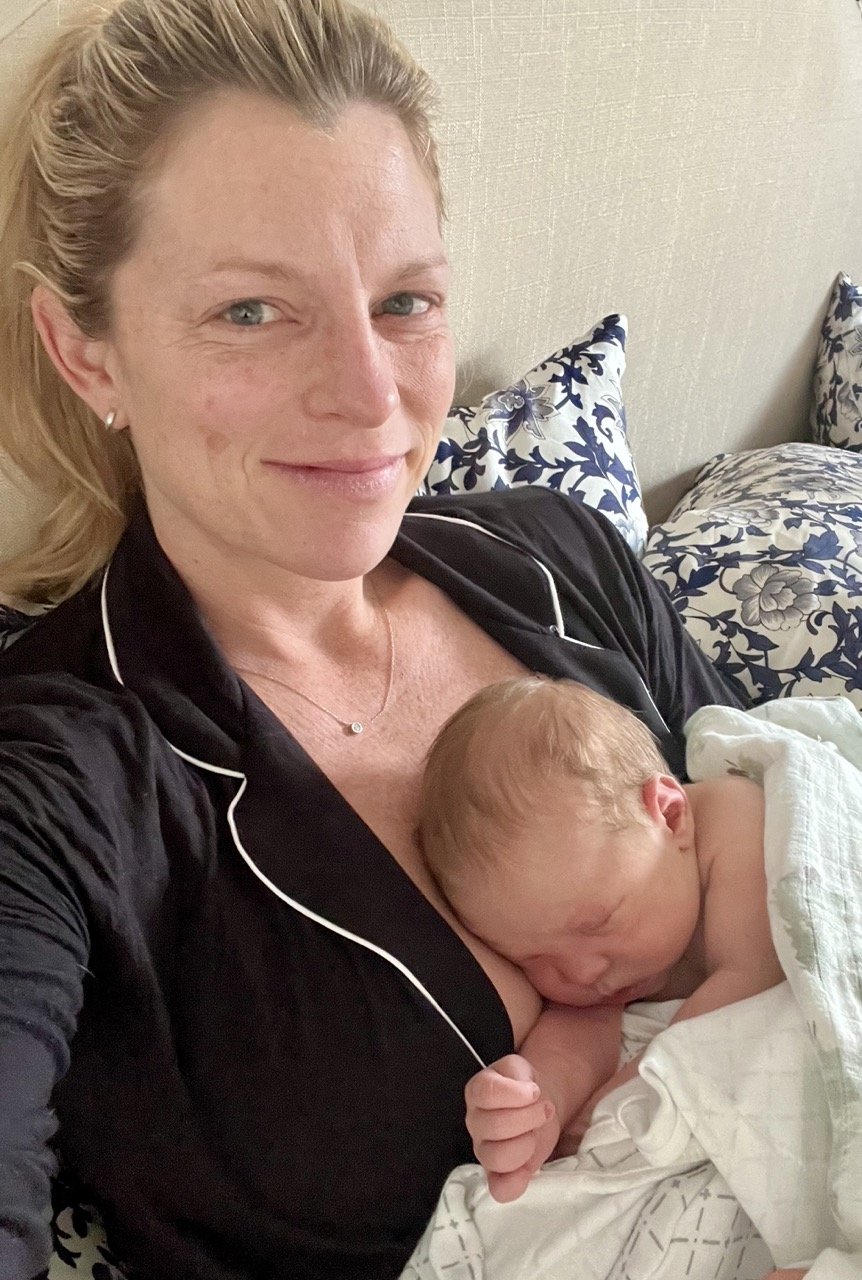HOW TO LIMIT WEIGHT GAIN DURING PREGNANCY
From The Perspective of a Functional Health Coach
Before getting pregnant I witnessed many of my women on their own journey. I soaked in the experience they had which often included discomfort in their body during pregnancy, unexplained excess weight gain throughout and trouble losing the weight and feeling like themselves again postpartum.
Being a functional health coach I’ve learned, seen and witnessed this fact:
The foundation that we build is going to determine what happens next.
In April of 2023 I gave birth to my son after years of researching, taking courses, talking with midwives, doulas and of course using the knowledge from over two decades of working with women as a functional health coach.
Can I first say, how stinkin’ cool is pregnancy and labor. I was so fascinated by the entire experience, even the uncomfortable parts.
Second, I’m almost 11 months out on the other side of pregnancy, and through talking and hearing others' experiences, I have realized just how much knowledge and support is lacking when it comes to preparing and supporting your body to respond and react as you’d like it to during the three phases of pregnancy: the before, preconception, pregnancy itself and postpartum recovery.
What I want to do in the below is share with you a ton of knowledge I’ve learned to make the process, no matter where you are in it, more enjoyable and easier by supporting your body to feel its best and function at its best during such an important time.
I’ll be sharing these bits of knowledge in the three parts I mentioned: the before (preconception), the during (pregnancy) and the postpartum era. Each stage is as important as the other for keeping your body functioning optimally and keeping control over the often worrisome component, shape change or weight gain.
*I want to preface that each woman’s journey is unique and it is important to use these tools as a general guide and work with a professional to support your unique body and pregnancy.
Why Health and Fitness Are Important For Conception
After working with dozens and dozens of women throughout their pregnancy journey, I have found that knowledge I deem common, is really not very common at all (even though it should be). With that said, I want to cover some of the biggest knowledge gaps and share support in areas of conception, weight management, optimal health and recovery that have drastically helped those women I have personally worked with, myself included.
When I hear a woman desiring to get pregnant, the focus usually becomes directed to checking for ovulation and having intercourse and trying to get pregnant as quickly as possible. And 9 times out of 10 it ends in months of frustration and stress on the process of creating this desired outcome.
Now there isn’t anything inherently wrong with that, however, the focus is on something that is not directly within your control and there is zero focus on actually supporting the likelihood of it happening. When I work with women desiring to conceive, we talk about timeline first (I recommend 6 months to a year or more in advance starting to prepare your body) and start to put a strong focus on the controls they have that will lay the foundations for IF they will conceive, how healthy the pregnancy and their body will be throughout pregnancy, and postpartum recovery, they are all interrelated.
The five pillars of health in conception are:
Nutrition
Physical activity
Adequate rest and sleep
Stress management
Hydration
All of these pillars play into the greater picture of hormone balance.
Sometimes we will need further focus to guide a true health homeostasis and balance of hormones and in that case we might look at:
Gut health (where hormones get created and communicate)
Detoxification
Mineral and nutrient balance
Cortisol rhythms
We always start behaviorally when it comes to creating foundations but often times more in depth labs can point us to areas of focus that we might otherwise not have looked. Some of the most popular labs I use in practice to take a deeper dive and ensure health is stable and hormones are balanced include:
Full serum labs (notice I said FULL, so many practitioners run just a few markers and don’t look at the full function of the body missing essential pieces that could cause an obstacle later that didn’t need to be an obstacle. I especially like to know a full thyroid panel, homocysteine, iron markers, blood sugar/insulin/hba1c/glycomark, and nutrient status - I’ll share more about the why in a minute)
Stool testing
Dutch hormone testing
ZRT saliva testing for cortisol rhythms
What we want to do before conceiving is not only align the body to make chances of conceiving easier, but we want to align the body for two other reasons that are important:
1. You pass along your microbiome to your offspring and it is their initial set up for health, so aligning your gut health and body is going to leave them with a healthier life and less complications to their health.
Your nutrition and lifestyle before and during pregnancy can actually influence your child's risk of developing chronic diseases such as obesity, diabetes, and cardiovascular disease later in life. Did you know that?
2. Ensuring the foundations are set in your health before conception starts you off at a better place metabolically which will support your ability to manage your health and weight throughout pregnancy and into post partum.
Not to mention these foundations set you up for hormonal balance and can help decrease the risk of gestational diabetes, preeclampsia, cesarean section and further complications throughout pregnancy and delivery.
If you’d like more detail and a helping hand in your pregnancy journey, get in touch! A second set of eyes can really help ensure that nothing is missed when it comes to supporting you in setting up for conception and a healthy pregnancy.
How To Optimize Health and Fitness During Pregnancy
Before and during pregnancy, health practices become even more important as they have a dual meaning, that applies to your health (the mother) and that to your future baby. The same five pillars of health in conception apply in pregnancy:
These pillars are:
Nutrition
Physical activity
Adequate rest and sleep
Stress management
Hydration
So, let’s take a deep dive into how I would support each one to support both fertility and also throughout pregnancy:
Nutrition: Both the what and the how much matter for health and hormones.
A balanced and nutritious diet during pregnancy supports fetal development and the health of the mother. It should include a variety of fruits, vegetables, whole grains, lean proteins, and healthy fats, providing essential nutrients such as folic acid, iron, calcium, and omega-3 fatty acids. Proper nutrition helps prevent pregnancy complications and ensures the healthy growth and development of the fetus.
The “what”: A balanced diet rich in whole foods provides the necessary vitamins, minerals, and antioxidants that support hormone production and regulation. Certain nutrients, such as omega-3 fatty acids, fiber, and antioxidants, play specific roles in hormone health. For example, omega-3s can help regulate hormone synthesis, while fiber can assist in the excretion of excess hormones.
The “how much”: If you have never logged your food, this is the time to do it. What you think you are doing and what you are often different. You’ll want to ensure you are truly eating enough food to keep the body from feeling stressed out, remember, not eating enough is a stress to the body and it will not prioritize ‘human creation’ if it doesn’t feel safe.
My biggest tip: Log your food! We are emotional beings and 10 out of 10 times I have found what someone thinks they are doing and what they are actually doing ARE DIFFERENT!
2. Physical Activity: Regular exercise helps to regulate hormones
Exercising regularly reduces insulin levels and increases insulin sensitivity. It also aids in balancing stress hormones and can improve the release of hormones that enhance mood and sleep quality.
Regular, moderate exercise during pregnancy can help manage weight gain, improve cardiovascular health, reduce the risk of gestational diabetes and preeclampsia, and alleviate some common discomforts like back pain.
It can also aid in labor and delivery!
Strength training and pelvic floor is my biggest recommendation to start sooner rather than later. Your body will be carrying a lot on top of your pelvis and interfering with the ability of your abdominals to stabilize your pelvis which means focusing on strengthening quads, glutes and pelvic floor will be extremely helpful to limit discomfort and support function.
My biggest tip: depending on your body’s current state, if you are challenged with cortisol dysregulation, hormones will struggle to be in balance and therefore ‘more’ physical activity, specifically strenuous will not be effective and will push you further from hormone balance. There are times when pulling most exercise, except walking and light yoga, can be beneficial and support one’s goal of conception. This is why knowing your body and looking at it objectively and thoroughly can be very helpful!
3. Sleep: Quality sleep is crucial for hormone regulation.
Quality sleep is essential for the health of pregnant women. It helps regulate stress hormones, supports immune function, and contributes to overall well-being. Pregnancy can affect sleep patterns, so finding comfortable sleeping positions, maintaining a regular sleep schedule, and practicing good sleep hygiene are important.
My biggest tip: stop all “to-do’s” and tasks 1-2 hours before bed. Focus on what I call slowing the 3 B’s, slow your brain, slow your body and slow your breath. An example of each is listed here:
Slowing your brain: brain dump, meditation
Slowing your body: moving slowly, gentle movement
Slowing your breath: deep breathing, meditation
4. Stress Management: Chronic stress can lead to elevated cortisol levels
This can disrupt other hormones such as insulin, estrogen, and progesterone. Practices such as meditation, deep breathing exercises, yoga, and other relaxation techniques can help manage stress levels. (check out details of my methods here!)
High levels of stress can negatively impact pregnancy, potentially leading to complications such as preterm birth and low birth weight.
Effective stress management techniques include relaxation exercises, deep breathing, prenatal yoga, mindfulness meditation, and seeking support from friends, family, or professionals. One of my most favorite habits to utilize is a deep breathing practice. It’s a double whammy, core activation and slowing respiration and heart rate to create an effective stress management behavior.
My biggest tip: Take an ‘outside-in’ view of your thoughts and life. What we do consistently becomes automatic which means we can become ‘numb’ to the typical stress of our life and can perceive it as normal or ‘not stressful’ when in actuality it is. I love using my Oura Ring for data to help me see what I wouldn’t typically recognize or know to support, myself.
5. Adequate Hydration: Water is essential for every bodily function
Hydration plays a huge role in hormone transport and production. Staying properly hydrated helps ensure that hormones can be efficiently transported to their target organs.
Maintaining hormone balance involves a holistic approach that includes diet, lifestyle, and environmental factors. It's about creating a healthy environment both inside and out to support the body's natural processes.
Adequate hydration is vital to support amniotic fluid, skin elasticity, digestive function, nutrient transport and body temperature regulation. Did you know hydration was THAT important? Aim to consume a minimum of ¾ your body weight in ounces.
My biggest tip: Put rubber bands or hair ties around your reusable water bottle to indicate how much water you want to drink. Each time you fill up your bottle, take one off. This will help you keep track of your intake and support more of it.
These 5 pillars are essential to your pregnancy journey, but there are additional factors which so often get overlooked, which can have quite the impact too, take a read:
Avoiding Toxins
Exposure to environmental toxins and endocrine-disrupting chemicals (EDCs) found in certain plastics, personal care products, and pesticides can interfere with hormone functions. Reducing exposure to these substances by choosing organic when possible, using natural personal care products, and avoiding plastic containers for food and water can help maintain hormone balance.
Get started now with this blog post I wrote on reducing toxins in your home: read here.
Gut Health
The gut microbiome plays a role in hormone regulation by metabolizing hormones and influencing their balance. A healthy gut flora, supported by a diet rich in fiber and fermented foods, can assist in maintaining hormonal equilibrium.
Note: Whether you have digestive issues or not, a stool test is an insightful look into your gut to support balance within the gut to support optimal hormone production and balance as well.
Together, these five plus focal points form a comprehensive approach to health during pregnancy, focusing on physical, mental, and emotional well-being. It is important to individualize your situation and working with a health coach can greatly support your ability to conceive, have a healthy pregnancy, minimize weight gain during pregnancy and aid in recovery post partum.
Supporting Your Postpartum Body
No one tells you what to expect postpartum.
I think because there’s so much that can differ in one’s journey. I remember being almost mad that nobody told me about how much pain I’d be in when I pee, or how to prevent and support nipple yeast infections or even how to hold your baby without causing irritation in the thumb joint (De Quervain hurt bad!)
The journey to embracing your body after childbirth can be challenging. Some might feel societal pressure, others create personal expectations about bouncing back quickly, and no matter if you care about your shape recovering or simply physical recovery, the tips and strategies I’m about to share naturally support both, in fact you really can’t have one without the other.
1. Set Realistic Expectations:
Understand that your body has undergone significant changes over nine months to grow and birth a new life. It's natural for the body to take time to recover. Remember, the "bounce back" narrative is often unrealistic and unhelpful. Instead focus on what is IN your control. This can be things like 5 minutes of meditation or deep breathing to calm your hormonal systems, taking time to shower or sit outside in the sun or prioritizing consistent hydration.
2. Create 5-30 minute self care practices:
Take time for activities that make you feel good and help you relax, feel restored or bring a focus back to you as an independent. The initial part of postpartum really is selfless as time is much revolved around feeding, changing diapers and consoling your new little one, however, there are ways to navigate time that could also be supporting self care.
For example, practicing deep breathing or guided meditation; taking deep breaths as you are breast or bottle feeding your baby. Set up other care whether a partner, a family member, friend or sitter to help give you 20-30 minutes a day to do something that makes you feel like your independent self, a passion, hobby or even plain old sunshine.
3. Start pelvic floor and TVA core exercises first:
You won’t regret doing this but you will regret postponing it. In fact, start these prior to pregnancy, do them throughout pregnancy and have them be the first work you do postpartum. Pelvic floor isn’t just about not peeing yourself when you walk, jump or sneeze, it’s about pelvic and spinal stability that allows your body to feel stable and when you resume workouts, generate force with more stability.
Many will try to go right back into their usual routine and I couldn’t advise more against that. Start with stability exercises, deep core and pelvic muscles and slowly build strength through your glutes, obliques and so on.
Upper body is also important. The new postures you are in for breastfeeding, bottle feeding, rocking, holding and caring for your baby can lead to some tight muscles. Give some focus to the upper back and neck.
4. Nourish hard and well:
All along the journey of pregnancy we are focusing on nourishment, however postpartum is one of the absolute most important and also hardest to accomplish. Not only is this important if you are breastfeeding, but your body is in need of a lot of nutrients to support recovery from labor and delivery.
Eating enough will nourish your body’s metabolism and support you in weight loss when the time is right. Eating too little too soon especially in an effort to lose weight can impede the healing process and hinder metabolic function too.
Remember your body thinks in safety first. We need to pull your body back to homeostasis before proving its safety again via a calorie deficit.
Start with nutrient dense foods like: leafy greens, colorful produce for antioxidants and immune boosting, Brazil nuts (selenium and zinc for thyroid), lots of protein and organ meats (high concentration of vital nutrients, including Vitamin B12, iron, protein, and essential amino acids. The liver is a nutritional gem, abundant in Vitamin A, iron, and copper - all essential for the body's energy production and immune function).
My own postpartum journey had its ups and downs, I decided to document it as a reminder to myself of my body’s strength, check out the summary here.
Here’s to Entering and Exiting This New Season of Life Educated, Empowered and Excited!
This journey is a huge one for parents, it has strong opposing emotions that run with it, stress and excitement, fatigue and endless energy, fear and so much magic. We work with women and men from all backgrounds and one area we love helping people is with their fertility, pregnancy and postpartum experiences. We can share all the general information to support you here but there is so much that needs to be individualized.
If you want to dive deeper, fill out an application! We can build a personalized package that works for you with timing, cost and support.
Let’s make this magic happen!






